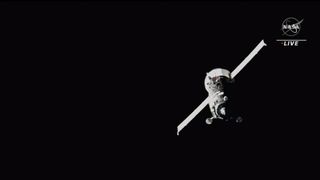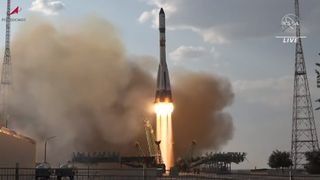A robotic Russian cargo craft arrived at the International Space Station today (May 24) after a speedy launch to deliver more than 2 tons of fresh supplies for astronauts aboard the orbiting laboratory.
The Progress 84 freighter docked at the space station at 12:19 p.m. EDT (1619 GMT) just over three hours after launching into orbit from the Russian-run Baikonur Cosmodrome in Kazakhstan.
"A perfect journey from launch to docking, delivering 2.7 tons of supplies to the International Space Station," NASA spokesperson Rob Navias said during live commentary.
Related: How Russia's Progress spaceships work (infographic)

The cargo ship's linked up with the space station's Russian-built Poisk module to complete its journey to the International Space Station will lasted less than 3.5 hours as the spacecraft made two orbits around Earth.
Progress 84 is packed with 5,492 pounds (2,491 kilograms) of food, water, propellant, cosmonaut clothing and other supplies, Navias said ahead of launch during live commentary. That cargo includes 3,399 pounds (1,542 kg) of dry cargo, 1,080 pounds (490 kg) of propellant, 926 pounds (420 kg) of water and 88 pounds (40 kg) of nitrogen.

The freighter is also carrying a variety of scientific gear, including "a launch device with a nanosatellite intended for the Parus-MGTU experiment (conducted by the N.E. Bauman Moscow State Technical University). Cosmonauts will launch it to test the technology of deploying a solar sail," EverydayAstronaut.com wrote.
Get the Space.com Newsletter
Breaking space news, the latest updates on rocket launches, skywatching events and more!
The Progress vehicle, which began flying in 1978, is one of three robotic spacecraft that currently deliver cargo to the space station. The other two are private American vehicles — SpaceX's Dragon capsule and Northop Grumman's Cygnus spaceraft.
Progress and Cygnus are expendable, burning up in Earth's atmosphere when their time in orbit is up. Dragon, however, is reusable, coming back down in soft, parachute-aided ocean splashdowns.
Editor's note: This story was updated to reflect the successful launch and docking of Progress 84 on its Soyuz 2.1a rocket.
Join our Space Forums to keep talking space on the latest missions, night sky and more! And if you have a news tip, correction or comment, let us know at: community@space.com.

Michael Wall is a Senior Space Writer with Space.com and joined the team in 2010. He primarily covers exoplanets, spaceflight and military space, but has been known to dabble in the space art beat. His book about the search for alien life, "Out There," was published on Nov. 13, 2018. Before becoming a science writer, Michael worked as a herpetologist and wildlife biologist. He has a Ph.D. in evolutionary biology from the University of Sydney, Australia, a bachelor's degree from the University of Arizona, and a graduate certificate in science writing from the University of California, Santa Cruz. To find out what his latest project is, you can follow Michael on Twitter.
